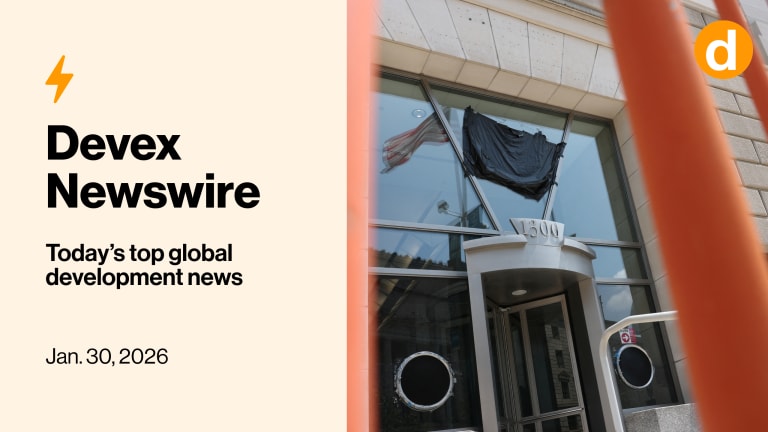Who lost the most? The 20 USAID contractors hit hardest
Over 5,300 USAID awards were abruptly canceled this year. A Devex analysis reveals the 20 contractors that lost the most — with billions in planned funds left on the table.
According to the latest data, the U.S. Agency for International Development has formally terminated more than 5,300 awards. A Devex analysis of those awards reveals that 20 major U.S. contractors each lost over $100 million in planned but undelivered funding, offering the clearest picture yet of how deeply the U.S. foreign aid freeze disrupted the global development industry. This exclusive report focuses specifically on U.S.-based for-profit contractors. Future coverage will examine nonprofit implementers and multilateral institutions, many of which also experienced deep cuts following the freeze. For each for-profit vendor, we identified: how many awards were terminated; the total estimated cost of those awards; the amount USAID had obligated before cancellation, representing what was officially committed for implementation; the unobligated balance — or money that had been approved in principle but was never released; and the percentage obligated, a metric that shows how far along each contractor was in delivering their USAID portfolio before it was shut down. Only contractors with over $100 million in total unobligated funds were included in this analysis. In several cases, entities that operate under multiple legal names, such as Dexis, or different divisions or offices in the same country (such as Tetra Tech) were grouped to reflect their corporate ownership. We did not aggregate non-U.S. branches of implementers such as Deloitte (Uganda) Limited. Together, these 20 contractors account for more than $9 billion in terminated USAID funding. Some were in the middle of implementation. Others hadn’t yet launched. What they shared was a common fate: being left in limbo, with canceled pipelines and no formal roadmap for reinstatement. 1. Chemonics International Terminated awards: 110 Terminated portfolio (unobligated): $2.34 billion Percent obligated before termination: 60% Remaining active awards: 7 Remaining active (unobligated): $2.16 billion out of $11.4 billion total Remaining active (obligated): $9.24 billion Despite losing more than $2.3 billion in unreleased funding across a vast portfolio, Chemonics still retains seven active USAID awards. The firm’s active pipeline remains one of the largest in the industry, with over $2 billion of the remaining active programs yet to be obligated. Chemonics suffered the deepest cuts by dollar value, losing over $2.3 billion in planned funding. Notable terminations included the Global Health Supply Chain IDIQ, which had 17% or $166.3 million left of the value pending to be obligated. Other awards include the Ukraine Confidence Building Initiative (UCBI 4) that won’t see about two-thirds ($170.7 million) of its initial award value. Or the Green Recovery Investment Platform, a climate change initiative with an estimated total cost of almost a quarter of a million dollars, that started in 2022 and had a little over 40% of its funds already obligated. Chemonics still has seven active USAID awards and still holds one of the largest remaining portfolios by estimated cost. 2. DAI Global LLC Terminated awards: 99 Terminated (unobligated): $1.28 billion Percent obligated before termination: 69% Remaining awards: 3 Remaining (unobligated): $106 million out of $281 million total Remaining (obligated): $176 million DAI lost more than $1.2 billion in canceled awards, including the Prosper Africa Trade and Investment Activity, which had about 30% or $159,503,649 of its total value pending to be committed. Its active portfolio now represents just 7% of its terminated value — a steep drop for one of USAID’s historically most active firms. 3. Tetra Tech (includes ARD Inc, Tetra Tech ES, Tetra Tech DRG JV, and Tetra Tech Inc.) Terminated awards: 68 Terminated (unobligated): $686 million Percent obligated before termination: 76% Remaining awards: 2 Remaining (unobligated): $18 million out of $32 million Remaining (obligated): $14 million Tetra Tech had obligated the majority (about three-quarters) of its awards before the freeze, but its overall loss remains massive in dollar terms. While two contracts remain active, their combined value is minimal compared to what was cut, amounting to just 2.7% of the terminated portfolio. 4. Cadmus Group Terminated awards: 5 Terminated (unobligated): $380 million Percent obligated before termination: 17% Remaining awards: Zero Cadmus experienced an early-stage wipeout: with only 17% of funds obligated, more than 80% of the planned contract value was cancelled, and no contract remained. 5. Deloitte Consulting LLP Terminated contracts: 28 Terminated (unobligated): $373 million Percent obligated before termination: 57% Remaining contracts: 2 Remaining (unobligated): $21 million out of $132 million total Remaining (obligated): $111 million Deloitte’s current contracts amount to a fraction of its terminated portfolio, but the firm has managed to stay present under the U.S. government's new foreign assistance architecture. 6. DT Global Terminated awards: 26 Terminated (unobligated): $342 million Percent obligated before termination: 53% Remaining awards: 1 Remaining (unobligated): $5.5 million out of $9.95 million Remaining (obligated): $4.45 million DT Global had over half of its funds already obligated when its projects were pulled. That said, its only remaining contract represents just 1.6% of the value of its terminated portfolio — a steep contraction. 7. Palladium International Terminated awards: 29 Terminated (unobligated): $337 million Percent obligated before termination: 67% Remaining awards: 2 Remaining (unobligated): $36 million out of $149 million Remaining (obligated): $114 million Palladium’s terminated awards span health systems, economic growth, and blended finance — with about one-third of those funds pulled before obligation. It retains two awards, though its active portfolio is roughly a tenth the size of what was terminated. 8. EnCompass LLC Terminated awards: 30 Terminated (unobligated): $314 million Percent obligated before termination: 38.5% Remaining awards: Zero EnCompass, one of the top USAID women-owned contractors and one of the major providers of monitoring and evaluation services, had over 60% of its funding never committed. It has since shut down operations, making it one of the clearest exits from the USAID contractor landscape. 9. Creative Associates International Terminated awards: 24 Terminated (unobligated): $311 million Percent obligated before termination: 47% Remaining awards: 0 With just 47% of its funds obligated, Creative Associates saw over half its planned portfolio canceled — disrupting work in education, youth, and governance across fragile and post-conflict zones. 10. Dexis (includes Dexis Consulting Group, Dexis Interactive, and Dexis Professional Services) Terminated awards: 23 Terminated (unobligated): $312 million Percent obligated before termination: 39% Remaining awards: 1 Remaining (unobligated): $8.3 million out of $57.4 million Remaining (obligated): $49 million One remaining contract keeps the door open for Dexis, but with less than 40% of its initial total award value obligated, most of its pipeline was eliminated before full execution. 11. ICF Inc (includes ICF Inc and ICF Macro) Terminated awards: 3 Terminated (unobligated): $308 million Percent obligated before termination: 41% Remaining awards: Zero 12. Global Solutions Ventures (A joint venture of Dexis Consulting and Zemitek LLC) Terminated awards: 5 Terminated (unobligated): $293 million Percent obligated before termination: 22% Remaining awards: Zero 13. Credence Management Solutions Terminated awards: 1 Terminated (unobligated): $284 million Percent obligated before termination: 58% Remaining awards: Zero 14. MSI (A Tetra Tech Company) Terminated awards: 19 Terminated (unobligated): $276 million Percent obligated before termination: 47% Remaining awards: 1 Remaining (unobligated): $0 out of $15.9 million Remaining (obligated): $15.9 million 15. Zemitek LLC Terminated awards: 8 Terminated (unobligated): $243 million Percent obligated before termination: 21% Remaining awards: Zero 16. Jefferson Consulting Group Terminated awards: 11 Terminated (unobligated): $183 million Percent obligated before termination: 42% Remaining awards: Zero 17. Abt Global LLC Terminated awards: 19 Terminated (unobligated): $183 million Percent obligated before termination: 81% Remaining awards: 3 Remaining (unobligated): $695 million out of $1.05 billion Remaining (obligated): $354 million 18. Environmental Incentives (Total) Terminated awards: 6 Terminated (unobligated): $139 million Percent obligated before termination: 42% Remaining awards: Zero 19. SoCha LLC Terminated awards: 15 Terminated (unobligated): $111 million Percent obligated before termination: 36% Remaining awards: Zero 20. International Development Group (IDG) Terminated awards: 3 Terminated (unobligated): $108 million Percent obligated before termination: 31% Remaining awards: Zero Update, March 27, 2025: Obligation percentages have been updated to reflect total obligated amounts over total estimated costs, offering a more accurate financial snapshot.
According to the latest data, the U.S. Agency for International Development has formally terminated more than 5,300 awards. A Devex analysis of those awards reveals that 20 major U.S. contractors each lost over $100 million in planned but undelivered funding, offering the clearest picture yet of how deeply the U.S. foreign aid freeze disrupted the global development industry.
This exclusive report focuses specifically on U.S.-based for-profit contractors. Future coverage will examine nonprofit implementers and multilateral institutions, many of which also experienced deep cuts following the freeze.
For each for-profit vendor, we identified: how many awards were terminated; the total estimated cost of those awards; the amount USAID had obligated before cancellation, representing what was officially committed for implementation; the unobligated balance — or money that had been approved in principle but was never released; and the percentage obligated, a metric that shows how far along each contractor was in delivering their USAID portfolio before it was shut down.
This story is forDevex Promembers
Unlock this story now with a 15-day free trial of Devex Pro.
With a Devex Pro subscription you'll get access to deeper analysis and exclusive insights from our reporters and analysts.
Start my free trialRequest a group subscription Printing articles to share with others is a breach of our terms and conditions and copyright policy. Please use the sharing options on the left side of the article. Devex Pro members may share up to 10 articles per month using the Pro share tool ( ).
Raquel Alcega leads the data research and analysis at Devex, providing advice to organizations on the latest funding and programmatic trends that shape the global development space. She also heads up the news business content strategy and designs internal knowledge management processes. Prior to joining Devex’s Barcelona office, she worked in business development in Washington, D.C., and as a researcher in Russia and Mexico.








